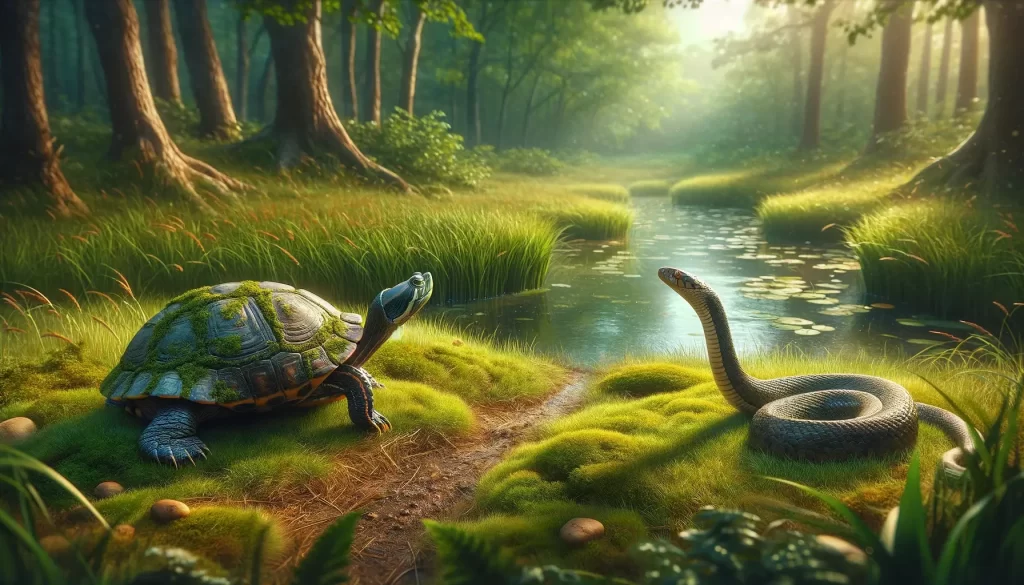Have you ever wondered if snakes have memories? It’s a question that has intrigued us for years.
As a nature enthusiast, I’ve spent countless hours observing these fascinating creatures, mesmerized by their behavior and intelligence.
Snakes have a way of captivating our attention, but do they possess the ability to remember?
Yes, snakes do have a memory. They can remember important survival information such as places of shelter, food sources, and how to navigate their environment.
So, join me on this journey of unraveling the mysteries of snake memory. Together, we’ll explore the fascinating world of snake cognition, the types of memory snakes possess, and the factors that influence their memory and learning.
We’ll also look at the practical implications of snake memory, debunk common myths, and discuss future research directions.
Get ready to be amazed by the intricate workings of snake memory and embark on a journey that will forever change the way you perceive these fascinating creatures.
Key Takeaways:
- Snakes have memory capabilities beyond basic instinct.
- Research and evidence indicate that snakes remember their environment, prey, and dangers.
- Snake memory plays a crucial role in their survival and behavior.
- Understanding snake memory can help us better interact with these creatures.
- Further research is needed to uncover the full extent of snake cognitive abilities.
Understanding Snake Cognition
In order to gain a deeper insight into the cognitive abilities of snakes, it is important to understand the basic cognitive functions that they possess.
Snakes exhibit a range of cognitive abilities that enable them to navigate their environment and interact with it in various ways.
Basic Cognitive Functions in Snakes
Snakes have developed unique adaptations that contribute to their cognitive abilities. These include:
- Perception: Snakes have specialized sensory systems that allow them to perceive their surroundings. Their ability to sense heat, vibration, and movement plays a crucial role in their cognitive processing.
. - Learning: While snakes may not possess the same level of complex learning abilities as mammals, they are capable of learning from their experiences. Through trial and error, they can adjust their behavior and adapt to different situations.
. - Problem-solving: Studies have shown that snakes are capable of solving simple problems. They can use their cognitive abilities to find ways to overcome obstacles or obtain food.
Studies on Snake Intelligence
Scientists have been undertaking extensive research to uncover the depths of snake intelligence.
These studies have revealed fascinating insights into the cognitive capabilities of these remarkable creatures.
Through behavioral experiments and observations, researchers have discovered that snakes exhibit intelligence in various ways.
For example, studies have demonstrated their ability to recognize specific objects, remember locations, and exhibit advanced problem-solving skills.
Furthermore, research has revealed that snakes possess a level of cognitive flexibility, enabling them to adapt their behavior in response to changing circumstances.
Their ability to make decisions based on past experiences suggests a complex cognitive process at work.
These studies on snake cognition provide valuable insights into the intelligence of these often misunderstood creatures and highlight the need for further exploration in this field.
Understanding snake cognition not only enhances our knowledge of these fascinating animals but also contributes to our broader understanding of animal cognition as a whole.
The Memory of Snakes

In this section, we will explore the fascinating topic of snake memory. While the idea of snakes having memory may sound intriguing, there is evidence to suggest that snakes do indeed possess this cognitive ability.
Let’s dive into the evidence of memory in snakes and explore the different types of memory they may utilize.
Evidence of Memory in Snakes
Multiple studies and observations provide compelling evidence of memory in snakes. These findings indicate that snakes have the ability to remember and recognize certain stimuli and experiences.
For example, researchers have conducted experiments where snakes were trained to associate specific scents or visual cues with rewards or punishments.
Subsequent tests showed that the snakes retained the associations and displayed memory-based behaviors.
Furthermore, field observations have provided evidence of memory in snakes. Snakes have been observed returning to previously visited locations or retracing their steps, suggesting that they remember spatial information and use it for navigation.
These findings suggest that snakes possess a sophisticated memory system that allows them to learn from their experiences and adapt their behaviors accordingly.
Types of Memory in Snakes
Just like humans and other animals, snakes may utilize different types of memory. Here are some of the types that researchers have identified:
- Short-term memory: This type of memory allows snakes to store and recall information for a short period of time. It plays a crucial role in immediate decision-making and learning tasks.
. - Long-term memory: Snakes can also possess long-term memory, which enables them to retain information for extended periods. This type of memory contributes to more complex learning, such as habit formation and spatial navigation.
. - Spatial memory: Snakes demonstrate the ability to remember and navigate through their environment. This spatial memory allows them to locate resources, return to safe locations, and find mates.
. - Associative memory: Snakes can form associations between stimuli and outcomes. They are capable of remembering and responding to specific cues, such as food sources or threats.
These different types of memory in snakes highlight the breadth and complexity of their cognitive abilities.
As we continue to uncover more about snake memory, the evidence points to the fact that snakes are not just instinctual creatures but possess cognitive abilities that allow them to learn, remember, and navigate their world.
Factors Influencing Snake Memory and Cognition

Snake memory and cognition are influenced by a variety of factors, including species-specific cognitive abilities as well as environmental and social factors.
Understanding these factors is key to gaining insight into the complex cognitive processes of snakes.
Species-Specific Cognitive Abilities
Different snake species exhibit varying cognitive abilities. Some species may have a greater capacity for memory and learning, while others may rely more heavily on instinctive behaviors.
Factors such as brain structure, neural connectivity, and evolutionary history contribute to these species-specific cognitive differences.
Research has shown that certain snake species, like the diamondback rattlesnake, possess remarkable cognitive abilities.
These snakes have demonstrated the ability to navigate complex environments, distinguish between prey and predators, and even exhibit problem-solving skills.
Environmental and Social Factors
The environment in which snakes live plays a significant role in shaping their memory and cognitive abilities.
Environmental factors such as temperature, humidity, and habitat complexity can impact a snake’s ability to form and retain memories.
Snakes that live in more diverse and challenging environments may develop enhanced cognitive abilities to adapt to their surroundings.
In addition, social interactions can influence snake memory and cognition. Snakes that engage in social behaviors, such as communal living or cooperative hunting, may have enhanced cognitive abilities compared to solitary individuals.
Social interactions can provide opportunities for snakes to learn from one another and develop more advanced cognitive skills.
The image above illustrates the intricate relationship between these factors. As snakes navigate their environments and interact with other individuals, their memory and cognitive abilities are shaped and influenced.
Practical Implications of Snake Memory
Understanding snake memory has important practical implications for both snakes themselves and their interaction with humans.
Snakes’ ability to remember and recall information plays a significant role in their survival strategies and behavior.
Survival Strategies
Snake memory is crucial for their survival in various environments. Snakes rely on their memory to remember locations of food sources, predator threats, and safe hiding spots.
By remembering the locations of prey and predators, snakes can efficiently navigate their surroundings and make strategic decisions to ensure their survival.
Furthermore, snake memory helps them adapt to changing conditions and anticipate future events.
By remembering previous experiences, snakes can learn from their mistakes and adjust their behavior to avoid dangerous situations.
This enables them to maximize their chances of survival in challenging environments.
Additionally, snakes’ memory plays a vital role in their hunting techniques. Some snake species rely on memory to ambush their prey or remember intricate patterns of movement to strike at the opportune moment.
Their ability to remember these details greatly enhances their hunting success.
Interaction with Humans
Snake-human interaction is a significant aspect of practical implications related to snake memory.
Understanding how snakes remember and respond to human presence can help mitigate conflicts and prevent snakebite incidents.
Snakes’ memory of previous encounters with humans can influence their behavior and responses.
For example, if a snake associates a negative experience with human presence, such as being threatened or attacked, it may develop defensive behaviors or avoid human-populated areas in the future.
Conversely, if a snake has positive experiences with humans, such as being handled gently by a snake expert, it may become more tolerant of human presence.
This knowledge can be valuable for professionals working with snakes, allowing them to establish safer interactions.
By understanding the practical implications of snake memory, we can develop strategies to promote coexistence and reduce potential conflicts between snakes and humans.
This includes educating the public about snake behavior, implementing proper snake handling techniques, and conserving habitats to minimize human-snake interactions.
Debunking Myths vs. Embracing Facts
Throughout history, there have been numerous myths and misconceptions surrounding snake intelligence.
These myths have often perpetuated false beliefs and hindered our understanding of these incredible creatures.
In this section, we aim to debunk some of the common myths about snake intelligence and shed light on what the science actually says.
Common Myths About Snake Intelligence
- Snakes are mindless creatures: One of the most prevalent myths about snakes is that they lack any form of intelligence. However, scientific research has shown that snakes possess cognitive abilities and have demonstrated remarkable problem-solving skills.
. - Snakes are driven solely by instinct: Another myth suggests that snakes rely solely on instinct and have no capacity for learning or memory. However, studies have revealed that snakes can learn from their experiences and remember specific stimuli, suggesting the presence of cognitive processes.
. - Snakes cannot solve complex tasks: It is commonly believed that snakes lack the ability to solve complex tasks due to their simple brain structure. On the contrary, research has shown that snakes are capable of solving intricate problems, such as navigating through mazes and manipulating objects.
What the Science Says
Scientific evidence on snake intelligence challenges these prevailing myths and provides a deeper understanding of snake cognition.
Studies have demonstrated that snakes possess cognitive abilities, including perception, learning, memory, and problem-solving.
Research has shown that snakes can learn from their environment, remember specific stimuli, and apply learned knowledge to navigate their surroundings.
They exhibit a range of strategies to locate prey, avoid predators, and adapt to changing circumstances.
Furthermore, snake behavior and responses indicate a level of cognitive flexibility that goes beyond instinctual behavior.
This flexibility suggests the presence of higher-order cognitive processes in snakes.
By embracing the scientific evidence on snake intelligence, we can dispel the myths surrounding these remarkable creatures and appreciate the fascinating cognitive abilities they possess.
Future Research Directions
As we continue to explore the fascinating world of snake memory and cognition, there are still many unanswered questions and areas that require further investigation.
Future research in this field holds great potential for uncovering new insights and expanding our understanding of these enigmatic creatures.
Gaps in Current Knowledge
Despite the progress made in studying snake memory and cognition, there are significant gaps in our current knowledge.
One area of interest is the specific mechanisms by which snakes form and retrieve memories.
While there is evidence to suggest that snakes possess memory, the underlying processes and neural structures involved are not yet fully understood.
Further research is needed to unravel these mysteries and shed light on the intricacies of snake memory.
Additionally, there is a lack of comprehensive studies on different snake species and their cognitive abilities.
Most research has focused on a limited number of snake species, leaving many others unexplored.
Understanding the variations in cognitive capacities among different snake species can provide valuable insights into the evolutionary origins and adaptations of snake memory.
Potential for Discoveries
The future of snake memory research holds immense potential for exciting discoveries.
With advancements in technology and methodologies, researchers can delve deeper into the cognitive abilities of snakes and unlock hidden facets of their memory.
By employing innovative experimental techniques, such as neuroimaging and genetic studies, we may be able to unravel the molecular and genetic foundations of snake memory.
Furthermore, exploring the relational aspects of snake cognition, such as social interactions and communication, can offer a new perspective on snake memory.
Investigating how snakes remember and recognize conspecifics or even individuals from other species can provide valuable insights into their social behaviors and decision-making processes.
As we embark on future research endeavors, it is essential to stay open-minded and embrace new possibilities.
The potential discoveries in snake cognition and memory are vast, and by pushing the boundaries of our knowledge, we may uncover surprises that challenge our current understanding and redefine our perception of these remarkable reptiles.
Conclusion
In conclusion, our exploration of snake memory and cognition reveals fascinating insights into the cognitive abilities of these reptiles.
Throughout this article, we have examined various aspects of snake memory, including evidence of their ability to remember and the different types of memory they possess.
We have also discussed factors that influence snake memory and cognition, as well as the practical implications of their memory.
Based on the research and scientific evidence presented, it is clear that snakes do possess memory.
Studies have shown that snakes can remember locations, recognize prey, and retain learned behaviors over time.
This suggests that their memory plays a vital role in their survival strategies and interactions with their environment and other organisms.
However, our understanding of snake memory and cognition is still incomplete. There is a need for further research to explore the gaps in our current knowledge and discover new insights into the complexities of snake memory.
By expanding our understanding of snake memory, we can not only gain a deeper appreciation for the cognitive abilities of these creatures but also contribute to their conservation and improve our interactions with them.
Overall, the study of snake memory and cognition is a fascinating field with significant implications.
It challenges myths and misconceptions while highlighting the remarkable cognitive abilities of these often misunderstood creatures.
As we continue to unravel the mysteries of snake memory, let us embrace the facts and engage in further research to unlock the full extent of their cognitive prowess.
Frequently Asked Questions
Q: Are snakes self aware?
A: Snakes are not self-aware in the way humans understand self-awareness. They do not possess the cognitive capabilities to reflect on their existence or recognize themselves as individuals separate from their environment.
Q: Are snakes intelligent?
A: Snakes exhibit a form of intelligence that is different from mammals or birds. They can learn, solve problems, and adapt to their environment to some extent, but their intelligence is primarily instinctual and focused on survival behaviors.
Q: Do snakes recognize each other?
A: Snakes can recognize each other through scent, but their social interactions are limited. Recognition is mostly used for identifying potential mates or territorial disputes rather than forming social bonds.
Q: Do snakes remember humans?
A: Snakes can recognize and remember humans, especially if they associate certain people with food, handling, or other consistent experiences. However, their memory and recognition are based more on scent and possibly visual cues rather than emotional bonds.
Q: Do snakes remember their homes?
A: Snakes have a good spatial memory and can remember the location of their homes or territories. They use environmental cues and their keen sense of smell to navigate back to familiar places if displaced.
Q: How long do snakes remember?
A: The duration of a snake’s memory is not well-documented, but evidence suggests they can remember important survival information, such as locations for food or shelter, for months or possibly longer.
Q: Do ball pythons have a good memory?
A: Ball pythons, like other snakes, can remember essential survival information and possibly recognize caretakers or specific handling patterns. However, the extent and duration of their memory capabilities require more research.
Q: Do snakes have a photographic memory?
A: Snakes do not have a photographic memory. Their memory and learning capabilities are geared towards survival and are based on instinctual behaviors rather than the ability to recall detailed images or events.




